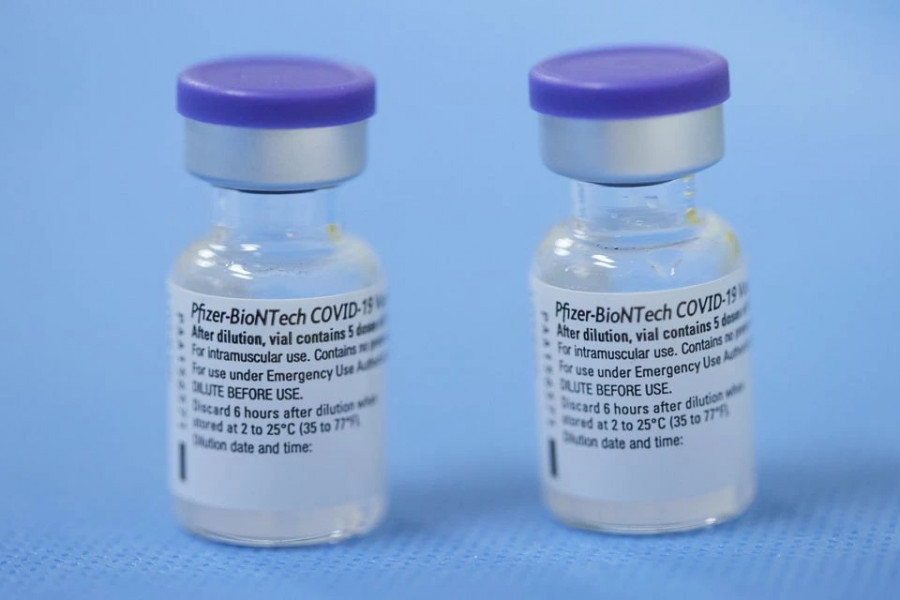Health
COVAX to provide Nepal 9.2 million doses of Pfizer-BioNTech vaccine
According to officials, the facility will deliver 1.5 million doses of the vaccine every month.
Arjun Poudel
Nepal is set to receive 9.2 million doses of the Pfizer-BioNTech Covid-19 vaccine from the COVAX facility, the United Nations-backed international vaccine sharing scheme.
Officials at the Ministry of Health and Population said that the facility will deliver 1.5 million doses of the vaccine every month between March and August.
“We are all set to receive the Pfizer-BioNtech vaccine from March,” Sagar Dahal, chief of National Immunisation Programme, told the Post. “Each month, the facility will supply 1.5 million doses until August.”
Earlier in January, the facility had offered to supply 6.2 million doses, and the health Ministry had decided to accept.
Nepal is currently using the Pfizer-BioNtech vaccine as booster shots.
The facility had supplied 100,620 doses of the Pfizer-BioNTech-19 vaccine in October and 664,560 doses in December.
The vaccine doses were first administered from 24 hospitals throughout the country to people with compromised immunity—those suffering from renal failure, cancer and heart patients and those having diabetes in the initial stage.
Later, the vaccine was administered to children between 12 and 17 years in 20 districts including three districts of Kathmandu, Bhaktapur and Lalitpur.
The vaccine needs to be stored in around minus 80 degrees Celsius for a longer-term storage. For up to 31 days, it can, however, be stored in normal temperatures (2 to 8 degrees Celsius).
Officials at the Logistic Management Section said that the government has the
capacity to store up to 1 million doses of the Pfizer-BioNTech vaccine and with UNICEF set to provide additional five ultra-cold freezers, the storage capacity will double.
Pfizer-BioNtech is an mRNA-based Covid-19 vaccine developed jointly by the US-based Pfizer and German firm Biontech. It uses a copy of a molecule called messenger RNA (mRNA) to produce an immune response.
The Pfizer-BioNtech vaccine is said to be 95 percent effective at preventing laboratory-confirmed infection with the coronavirus.
According to the US Centres for Disease Control and Prevention (CDC), the Pfizer-BioNTech vaccine was also highly effective at preventing laboratory-confirmed Covid-19 infections in adolescents between 12 and 15 years old, and the immune response in these adolescents was at least as strong as the immune response in 16 to 25-year-olds in clinical trials.
“Evidence shows mRNA Covid-19 vaccines offer similar protection in real-world conditions as they have in clinical trial settings—reducing the risk of Covid-19, including severe illness by 90 percent or more, among people who are fully vaccinated,” the CDC said on its website.
Officials at the Health Ministry said that the vaccine will be used as first dose, second dose and booster dose, as the National Immunisation Advisory Committee has given permission for the vaccine mix and match.
Research shows that such ‘mix and match’ regimens are highly effective at preventing Covid-19—roughly matching or even exceeding the performance of mRNA vaccines like Pfizer-BioNTech and Moderna.
Administering a different Covid-19 vaccine after a single dose of the AstraZeneca or Pfizer-BioNTech vaccine is safe and effective and could boost the immune response, a study of 1,000 volunteers has found, according to a report published on December 7 in the British Medical Journal.
The results, reported in the Lancet, another British journal, showed that having a dose of the Moderna vaccine after an initial AstraZeneca or Pfizer dose induced a higher binding and neutralising antibody response than seen after two doses of either AstraZeneca or Pfizer.
Studies have shown that people who receive two different Covid-19 vaccines generate potent immune responses, with side effects no worse than those caused by standard regimens, according to a report published in the science journal Nature in October.
Nepal needs to vaccinate around 26 million of a little over 29 million people, as around three million are children under five years of age. Authorities had decided to inoculate children between five and 11 years but no deal has been reached so far to purchase vaccines for them.
So far, 17,786,133 people or 60.9 percent of the total population have been fully immunised, according to the Health Ministry.
Nepal so far has received 47,882, 800 doses of Covid-19 vaccines— AstraZeneca, Cell, Moderna, Janssen and pfizer-bioNTech from various sources.




 9.7°C Kathmandu
9.7°C Kathmandu















